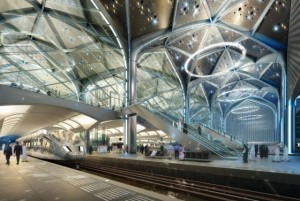Source: www.tradearabia.com
Private sector companies in Bahrain opened talks with the government about a proposal to build a 90km railway link, expected to cost around $4.2 billion, between Bahrain and Saudi Arabia.

Among the key issues being explored were a Build Operate and Transfer (BOT) option, which would involve the project becoming a private sector undertaking, supervised by the government.
Private sector companies are expected to form a consortium to give them the capability to take on such a large project. About 20 companies from Bahrain, the region and around the world are involved in the talks, which will conclude at the Moevenpick Hotel in Muharraq today.
Discussions will conclude with recommendations, an action plan and resolutions for decision-makers in Bahrain and Saudi Arabia to mandate the way forward.
The rail link will start in Kuwait and pass by the eastern Saudi city of Dammam, connecting with Bahrain through a bridge parallel to King Fahad Causeway before reaching Qatar via Salwa. Another line will connect Bahrain with the UAE through Bathaa.
The railway line will also run through Abu Dhabi and Al Ain to reach Oman through Sahar and Muscat and connect Qatar and Bahrain through a bridge. It will be part of a $25 billion railway project, which will link Bahrain and the other GCC countries through a 2,117km network.
Land acquisition has been estimated to cost $3.1 billion and the cost of purchasing locomotives is pegged at $1.8 billion. The project, in which trains will run at speeds of up to 350km/h, is set to boost travel and trade ties between the six countries.
‘The proposal is to have a BOT project by the private sector to link this essential project from Bahrain to the GCC,’ said Transport Ministry acting Under-Secretary Shaikh Bader bin Khalifa Al Khalifa.
‘The GCC leaders have agreed 2017 as the year of operation, so we are doing the blueprint for the target year of operation. We would also like to hear if some consultants or companies would like to construct other parts of the railway and stations in Bahrain, not just the bridge.”
‘Each country will shoulder its own cost and we are working out the cost at the moment. It will be a private sector project which is overlooked by the government,” he added.
Shaikh Bader noted the benefits of having a railway link in terms of saving travel time and economic development.
He said railways had helped advance economic development in Europe, the Americas and the Far East and the Gulf would be no different.
‘Instead of taking a plane, you can take the train and it’s probably faster because you don’t have to check into the airport or take time through arrivals,’ said the official.
‘When we want to travel on King Fahad Causeway and it is congested, the train will pass through much quicker.’
World Bank senior transport specialist Dr Ramiz Al Assar said there had been strong private sector interest in a BOT option, but all this was pending approval by Bahrain and Saudi authorities.
He said because of the scale of the project, private sector companies would have to form a consortium to be able to manage such an undertaking.
A feasibility study conducted in 2009 suggested the 90km railway link from Dammam to Bahrain would cost between $4.2 billion and $4.5 billion according to 2008 figures, explained Dr Al Assar.
It will be located 40km from Dammam to the causeway, 40km on the new causeway and 10km inland in Bahrain.
‘I expect the cost to go down as in 2008 the cost of materials was more, but again this is only an assessment by consultants,’ he said. ‘Construction is expected to start in 2013-2014 and conclude in 2017.”
‘However, authorities are looking at the implementation schedule to be more realistic, plus or minus a couple of years. It won’t matter as long as we see the project on the ground,’ Dr Al Assar added.


















